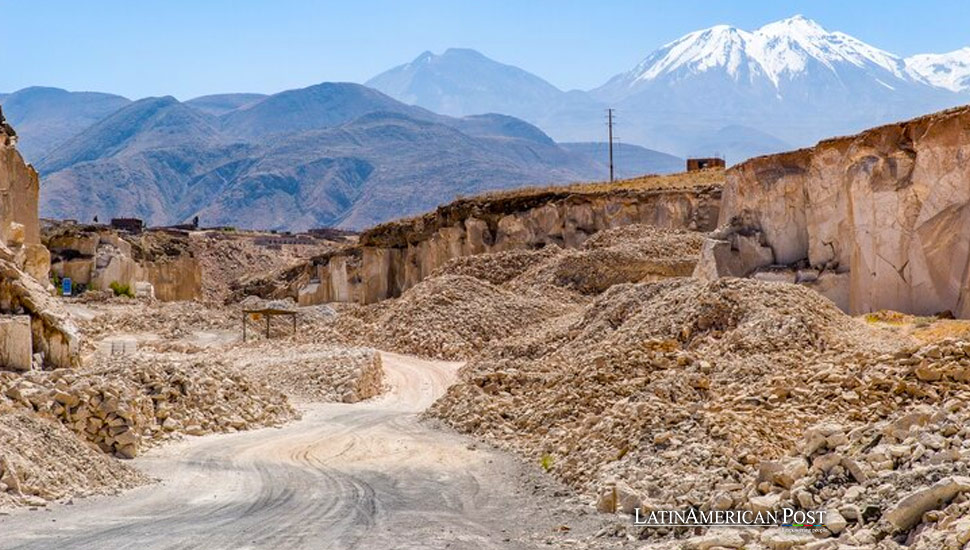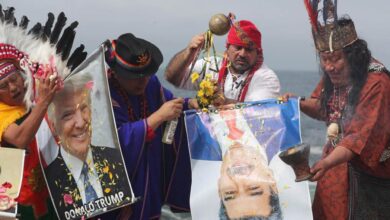Peru Authorizes Barrick Mining Near Border Amid Controversy

Peruvian Prime Minister Gustavo Adrianzén announced the government’s decision to permit Barrick’s mining exploration within a constitutionally restricted border zone, sparking debate about national sovereignty and its implications for economic growth.
In a move that has stirred both economic optimism and political controversy, the Peruvian government has authorized mining exploration by the multinational company Barrick within a constitutionally restricted zone near the country’s southern border. This decision marks a significant shift in Peru’s approach to foreign investment in sensitive border areas, highlighting the government’s focus on economic revitalization amidst ongoing challenges.
Prime Minister Gustavo Adrianzén announced on Wednesday that the Council of Ministers had declared the necessity of authorizing Barrick’s mining exploration within 50 kilometers of the borders with Chile and Bolivia. According to Article 71 of the Peruvian Constitution, which aims to protect national sovereignty and territorial integrity, this zone is typically off-limits to private and foreign investment.
“The government has decided to declare private investment in mining as a public necessity,” Adrianzén stated in a press conference. “This authorization includes Barrick’s exploration activities on the southern border, after thorough analysis and considerations for our sovereignty and territorial integrity.”
Constitutional Constraints and Exceptions
Peru’s Constitution explicitly restricts foreign ownership and operations within 50 kilometers of the borders to safeguard national interests. Article 71 states that “foreigners cannot acquire or possess, by any title, mines, lands, forests, waters, fuels, or energy sources within fifty kilometers of the borders, under penalty of forfeiture to the State.”
However, the Constitution allows exceptions in cases of public necessity, as declared by a supreme decree approved by the Council of Ministers. Adrianzén emphasized that the decision followed extensive evaluations by the Ministry of Energy and Mines and the Ministry of Defense, ensuring that national sovereignty remains protected.
Economic Considerations
The authorization for Barrick, a leading global mining company, to operate in this sensitive area underscores the Peruvian government’s strategy to boost economic recovery. The mining sector is a crucial driver of Peru’s economy, contributing significantly to employment, export revenues, and overall economic growth. By facilitating foreign investment in mining, the government aims to stimulate economic activity and attract further international interest.
“The expansion of our mining portfolio is essential for economic reactivation,” Adrianzén explained. “Mining is one of the engines driving our economic recovery efforts.”
Peru has a long mining history, dating back to pre-Columbian times when ancient civilizations such as the Incas exploited mineral resources. The country’s rich deposits of gold, silver, copper, zinc, and other minerals have made it a global mining powerhouse. Over the centuries, mining has shaped Peru’s economic landscape, contributing to its development and growth.
However, the sector has also been a source of social and environmental conflicts. The influx of foreign companies has often led to disputes over land rights, environmental degradation, and the distribution of mining benefits. These issues have prompted calls for more stringent regulations and greater community involvement in mining projects.
The decision to allow Barrick’s exploration near the border has reignited debates over the balance between economic development and national sovereignty. Critics argue that permitting foreign mining operations in restricted zones could compromise Peru’s territorial integrity and sovereignty. They call for stricter oversight and safeguards to ensure national interests are not undermined.
Proponents, on the other hand, highlight the potential economic benefits. Foreign investment in mining can lead to job creation, infrastructure development, and increased government revenues through taxes and royalties. These funds can be used to improve public services and support social programs, contributing to broader economic growth.
Environmental and Social Concerns
Mining operations, particularly in ecologically sensitive areas, raise significant environmental and social concerns. The impact on local ecosystems, water resources, and indigenous communities can be profound. Environmentalists and community advocates stress the importance of conducting thorough environmental impact assessments and implementing sustainable practices to mitigate adverse effects.
Barrick’s operations in other countries have faced scrutiny for their environmental and social impacts. Ensuring their activities in Peru adhere to high environmental standards and respect local communities’ rights will be crucial in maintaining social license and avoiding conflicts.
Effective community engagement is essential for the success of mining projects. Building trust and fostering collaboration with local communities help address concerns and ensure that the benefits of mining are shared equitably. Transparent communication, participatory decision-making, and fair compensation are essential to successful community relations.
In Peru, indigenous and rural communities have historically been marginalized in mining decision-making processes. Enhancing community engagement and ensuring that local voices are heard can help build support for mining projects and contribute to more sustainable outcomes.
Future Prospects and Challenges
The authorization for Barrick’s exploration near the border represents a significant step in Peru’s efforts to attract foreign investment and boost economic growth. However, it also challenges ensuring these investments align with national interests and contribute to sustainable development.
Moving forward, the Peruvian government will need to balance the economic benefits of mining with the need to protect national sovereignty, environmental integrity, and community well-being. Strengthening regulatory frameworks, enhancing oversight, and promoting responsible mining practices will be essential in achieving this balance.
The Peruvian government’s decision to allow Barrick to conduct mining exploration within a constitutionally restricted border zone marks a pivotal moment in the country’s foreign investment and economic development approach. While the move holds promise for economic revitalization, it raises important questions about sovereignty, environmental protection, and social equity.
Also read: Potato Production in Peru Declines Due to Climate Vulnerability
As Peru navigates these complex issues, the experiences of other Latin American countries can offer valuable insights. The region’s mining history highlights the importance of balancing economic growth with the protection of national interests and the well-being of local communities.
Ultimately, the success of Peru’s mining sector will depend on the ability to foster sustainable and inclusive development, ensuring that the benefits of mining are shared broadly and that the country’s rich natural heritage is preserved for future generations.





